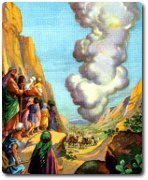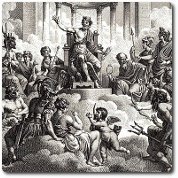Tess of the d'Urbervilles Contents
- Social / political context
- Religious / philosophical context
- Chapters 1-9
- Chapters 10-19
- Chapters 20-29
- Chapters 30-39
- Chapters 40-49
- Chapters 50-59
- Tess as a 'Pure Woman'
- Tess as a secular pilgrim
- Tess as a victim
- The world of women
- Tess as an outsider
- Coincidence, destiny and fate
- Disempowerment of the working class
- Heredity and inheritance
- Laws of nature vs. laws of society
- Modernity
- Nature as sympathetic or indifferent
- Patterns of the past
- Sexual predation
- Inner conflicts: body against soul
Chapter 50
Synopsis of chapter 50
Tess returns to her parents' home to find her mother seriously ill, but not at death's door. She takes charge of the family as best she can, getting the garden and allotment dug over for the coming season.
Whilst digging one evening, she finds herself joined by Alec, disguised as a farm yokel. He again presses her to let him take care of her and her family in return for her favours. She has to admit that, in effect, she has no husband, but still rejects his advances.
As he angrily leaves, news is brought that Jack Durbeyfield has had a sudden heart attack and is dead. As he was the last 'livier' or lease-holder of the property, it now reverts to the landlord, who wants it for his own labourers.
Commentary on chapter 50
The pattern of the tragic fall in Tess's circumstances continues. For every effort to bring order, especially to her family, there is a greater reaction resulting in decline and disorder. Her father's heart condition has been talked about from the earliest chapters, but it is at this moment it manifests itself fatally.
The reader senses that Alec is bound to turn up again, as predators and villains do in Victorian melodramas. This unlikely scene, where he dresses in old fashioned working clothes, prefigures further bizarre yet predictable appearances. These visits help maintain the constant sense of dread and threat to a growingly helpless Tess. From a literary point of view, the mock-peasant dress can be seen as a ghastly parody of Angel's farming efforts.
turnpike-roads: toll roads, which would be much better maintained than the ordinary by-ways.
witches...pricked and ducked: country superstitions to counteract witches included 'pricking' (plunging a needle into them to nullify any particular spell against you - as happens to Eustacia Vye in Hardy's The Return of the Native) and 'ducking' (throwing them into water to see if they float or sink. Those who sink are not considered to be witches).
the seed-potatoes: the potatoes kept for planting form next year's crop. If these are eaten in desperation, then clearly there is nothing to plant for next year. This is what Tess has to rectify.
 'pillar of a cloud': a reference to Exodus 13:21-22; Numbers 14:14, where God leads the Israelites through the wilderness by the supernatural guidance of a pillar of cloud by day and pillar of fire at night. Hardy's use of the term 'wall' may have been transferred from the account of the crossing of the Red Sea where the term is used of the water (Exodus 14:22-24; see also note in Ch 23).
'pillar of a cloud': a reference to Exodus 13:21-22; Numbers 14:14, where God leads the Israelites through the wilderness by the supernatural guidance of a pillar of cloud by day and pillar of fire at night. Hardy's use of the term 'wall' may have been transferred from the account of the crossing of the Red Sea where the term is used of the water (Exodus 14:22-24; see also note in Ch 23).
that scene of Milton's: another reference to Milton's epic poem Paradise Lost, this time Book IX 626-630.
'the Old Other One': Satan, the devil, tempting Eve to follow him towards the forbidden tree in the Garden of Eden. Again, this parodies the scene in Ch 19 where Angel plays the harp. As in Paradise Lost, the devil can tempt Eve when Adam is away.
his heart was growed in: The threat of closure of the ‘circle of fat' around the heart, referred to in Ch 3, has come true. It sounds like congestive heart failure. It is quite coincidental a doctor was present, they being few and far between in country areas. Jack has had to go to Shaston (Stourcastle) before to get medical advice (Ch 3).
the last of the three lives: Jack was a 'livier', that is, the lease of his cottage could be held by three generations of a family before the landlord could reclaim the property. Jack is the last of the three generations. See also note on copyholders in Ch 9.
 Olympians of the county: The Olympians were the major Greek gods. Hardy continues to insist on previous patterns of aristocratic behaviour now being turned back on to their wretched descendants.
Olympians of the county: The Olympians were the major Greek gods. Hardy continues to insist on previous patterns of aristocratic behaviour now being turned back on to their wretched descendants.
Flux and reflux – the rhythm of change…: another echo of Ecclesiastes 1:9, especially the reference to there being ‘no new thing under the sun.'
Place
Tess revisits the past as she returns to her parents' home, especially its faint connections with Angel. She still regrets his failure to dance with her (Ch 2, with which compare Angel's revisit in Ch 54), an act that now seems a prefiguring symbol of his greater absence from their marriage.
Again, the contrast between the upland plateau and the heavy clay soil of Blackmore Vale is made, as Hardy continues to remind us of the symbolic geography of Wessex.
Nuttlebury: earlier versions have Nuzzlebury. Hazelbury Bryan, three miles north-west of Bulbarrow.
Hambledon Hill: its real name, as also Bulbarrow. See also Ch 4. They are both part of the chalk ridge that forms the southern border of Blackmore Vale.
Vocabulary
allotment-plot: common land divided up into small enclosures for villagers to cultivate for themselves
antiquarians: local historians
determined: came to its end
flaccid: limp, flabby
nebulosity: cloudiness, haziness
whickered: sniggered
Investigating chapter 50
- Examine the description of Tess's night journey.
- Collect references to Tess helping her family both earlier in the novel and here.
- What benefit has been derived from her help?
- What benefit will Tess's preparation of the ground for planting be to them?
- What do your answers suggest about the family and any future efforts to help them?
- In what way are future efforts likely to be dangerous for Tess?
- Do you see anything ironical in all this?
- Does Hardy set up any parallels in this chapter between Alec, his words and his actions, and Angel, his words and his actions?
- Were you expecting Alec to re-appear?
- What is your reaction to his re-appearance and the form it takes?
- What does Hardy lead us to expect to happen at this juncture?
- English Standard Version
- King James Version
- English Standard Version
- King James Version
- English Standard Version
- King James Version
- English Standard Version
- King James Version
Recently Viewed
-
Tess of the d'Urbervilles » Chapter 50
now -
Christina Rossetti, selected poems » When I am dead, my dearest
just now -
A-Z: General definitions » Epic
just now -
A-Z: General definitions » Muse
just now -
A-Z: General definitions » Justice
just now -
A-Z: General definitions » Forgiveness
1 minute ago -
A-Z: General definitions » Son of Man
1 minute ago -
Tess of the d'Urbervilles » Alec
1 minute ago -
The Color Purple » The Color Purple: Historical and social structures
22 minutes ago -
Tess of the d'Urbervilles » Chapter 19
22 minutes ago -
Christina Rossetti, selected poems » Song (When I am dead, my dearest)
22 minutes ago -
A-Z: General definitions » Tree of knowledge
22 minutes ago